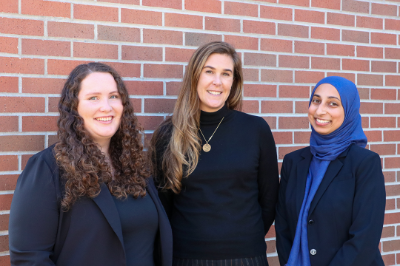LSJLC's fellowship program is designed to assist LLS graduates in finding their first positions in public interest law

This fall, the Loyola Social Justice Law Clinic's Juvenile Innocence and Fair Sentencing (JIFS) Clinic and Loyola Project for the Innocent (LPI) welcome three post-graduate fellows, who have received LLS Post-Graduate Fellowships in Public Interest Law. The Public Interest Law Fellowship program is designed to assist LLS graduates in finding their footing in public interest law and to provide legal services where they are most needed.
Ayesha Hussain ’21 joins Loyola Project for the Innocent (LPI), where her fellowship project will focus on providing post-conviction legal services primarily for cases involving post-conviction DNA testing. Having participated in the LPI clinic as a student, and now a month into her Fellowship, Ayesha shares that “from an intellectually stimulating, as well as a morally fulfilling, perspective, indigent post-conviction habeas work is my passion. I love being part of such a niche area of the criminal defense community, helping wrongfully convicted individuals access the legal system's last glimmer of hope for the innocent. I am so grateful to have such a supportive group of people at LPI to work with and learn from, and who remind me of how important this work truly is.” After her fellowship, Ayesha plans to continue representing post-conviction clients and advocating for their rights in the criminal justice system.
Claire Davey ’21, joins the Juvenile Innocence and Fair Sentencing Clinic (JIFS). Claire’s fellowship is focused on the rights of intellectually and developmentally disabled inmates in their parole hearings. As mentioned in preLaw Magazine, while a student with JIFS, Claire represented several clients with disabilities in their parole hearings. She shares that “through that experience, I discovered that California’s parole process, with its heavy emphasis on insight, participation in educational programming, and behavior while incarcerated, creates a nearly impossible standard for many inmates with cognitive impairments, thus prolonging their incarceration for reasons having nothing to do with their risk of dangerousness if released.” The goal of Claire’s project is to advocate for the need for a new parole process for inmates with these types of disabilities, both in her individual client cases and through research-based policy recommendations.
Jessica Sanborn ’21 also joins the Juvenile Innocence and Fair Sentencing Clinic (JIFS). The goal of Jessica’s fellowship project is to support the implementation of Los Angeles County District Attorney George Gascón’s Special Directive 20-14, which created a Resentencing Unit in the DA’s Office, pledging to examine up to 30,000 out of policy sentences, including up to 7,000 youth sentences. Jessica, who was in the JIFS clinic during law school, shares that “because the JIFS Clinic has been central to juvenile sentencing reform in Los Angeles County, it is part of a small team of stakeholders that will assist the Resentencing Unit in setting up protocols, adopting best practices, and assuring the early success of the Unit. I am the liaison with the Unit for the JIFS Clinic’s clients. I feel incredibly privileged to continue my work with JIFS, as it was by far the most rewarding experience I had in law school, and I look forward to a career in post-conviction at a time when there appears to be real potential for California sentencing reform and juvenile justice.”